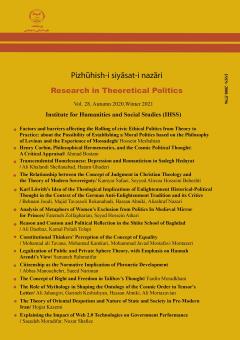Analysis of Metaphors of Women's Exclusion from Politics In Medieval Mirror for Princes
Subject Areas : Research in Theoritical Politics
fatemeh zolfagharian
1
*
![]() ,
h a
2
,
h a
2
![]()
1 - Ferdosi University
2 - Ferdosi University
Keywords: Metaphor, Women, Mirror of princes, Gender and Masculine intellect,
Abstract :
The sphere of politics has long been defined based on a masculine approach and women have been neglected and have not been given a clear and prominent position in the politics. Even in the Western philosophy, which is known as a manifestation of rationalism, women are recognized as the second sex, on the assumption that intelligence is a masculine character. Due to the fact that the status and position of women in the mirror of princes in different periods, is one of the ways that can clarify this status in different historical ages, in this article their rejection or acceptance by epistemological systems has been analyzed. What appears in the mirror of princes as prominent political texts in the Medieval is a depiction of a creature called woman who was nowhere present and, therefore, men have drawn their appearance as they liked. But the question is: what metaphors were in medieval the mirror of princes and historical texts that have reinforced the exclusion and marginalization of women? For this purpose, here the prepositions of the political texts and governance literature have been examined with the theoretical framework of metaphorical analysis and classification of metaphors into three titles: metaphor of creation, metaphor of governance and philosophical metaphor of masculine intellect. This article is based on a hypothesis in which women were excluded and confined to a private life for many years, and such metaphors have played a special and effective role in removing women from the political arena.
ابوزید، نصرحامد (1397)، دایره های ترس؛ زنان در گفتمان دینی، تهران: نگاه معاصر.
بارتلمه، کریستین (1337)، زن در حقوق ساسانی، ترجمۀ ناصرالدین صاحب زمانی، تهران: موسسه مطبوعاتی عطایی.
چارتریس – بلک، جاناتان (1397)، تحلیل انتقادی استعاره؛ رویکردی شناختی – پیکره¬ای، ترجمۀ یکتا پناه پور، قم: لوگوس.
حسینی، مریم (1393)، ریشه های زن ستیزی در ادبیات کلاسیک فارسی، چاپ دوم، تهران: نشر چشمه.
حلبی، علیاصغر (1370)، تاریخ اندیشههای سیاسی در ایران و جهان اسلامی، تهران: انتشارات بهبهانی.
دانون، جوزفین (1397)، نظریۀ فمنیستی، ترجمۀ فرزانه راجی، چاپ دوم، تهران: نشر چشمه.
رجائی، فرهنگ (1373)، معرکه جهانبینیها (در خردورزی سیاسی و هویت ما ایرانیان)، تهران احیاء کتاب.
طباطبایى، سیدجواد (1357)، خواجه نظامالملک، تهران: طرح نو.
علوی، هدایت الله (1377)، زناشویی در ایران باستان، تهران: هیرمند.
عنبرسوز، مریم (1390)، زن در ایران باستان، تهران: روشنگران و مطاعات زنان.
عنصرالمعالی، کیکاوس بن اسکندر (1371)، قابوس نامه، تصحیح غلامحسین یوسفی، تهران: انتشارات علمی و فرهنگی.
غزالی، محمد (1389)، نصیحه الملوک، تهران: جامی.
فیرحى، داود (1378)، قدرت، دانش مشروعیت در اسلام، تهران: نشر نى.
لمبتون، آن.کی.اس (1374)، دولت و حکومت در اسلام. ترجمه و تحقیق: سیدعباس صالحی و محمدمهدی فقیهی، تهران: عروج.
لوید، ژنویو (1381)، عقل مذکر؛ مردانگی و زنانگی در فلسفه غرب، ترجمۀ محبوبه مهاجر، تهران: نشر نی.
محمدپور، احمد (1397)، ضد روش: زمینه¬های فلسفی و رویه¬های عملی در روش شناسی کیفی، قم: لوگوس.
مردیها، مرتضی، پاک نیا، محبوبه (1388)، سیطره جنس، تهران: نشر نی.
نظام الملک، حسن بن علی (1398)، سیرالملوک، تصحیح محمود عابدی، تهران: فرهنگستان زبان و ادب فارسی.
هاشمی، زهره (1389)، نظریه استعاره مفهومی از دیگاه لیکاف و جانسون، فصلنامه ادب پژوهی، (12)4، 130-119.
هاوکس، ترنس (1377)، استعاره مجموعه مکتبها، سبکها و اصطلاحهای ادبی و هنری، ترجمۀ فرزانه طاهری، تهران: نشر مرکز.
یوسفیراد، مرتضی (1383)، متدلوژی سیاستنامهنویسی، علوم سیاسی، شماره 28.
Cameron, L. and Low, G, (1999). Metaphor. Language Teaching, (32)2, 77-96.
Croft, W. (1993). The Role of Domains in the Interpretation of Metaphor and Metonymies. Cognitive Linguistics, (4)4, 335-370.
Lakoff, G & Johnson, M (1980). Metaphors We Live by. Chicago and London. University of Chicago Press.

